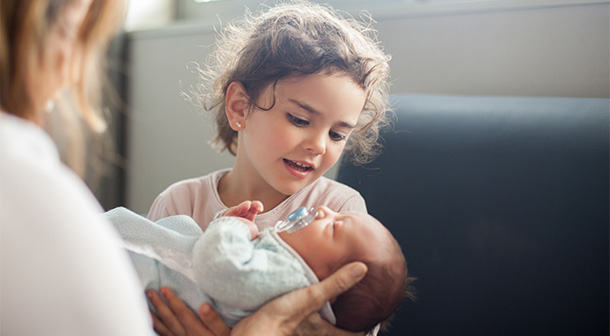Tips for a Growing Family, Including Adoption
By GetParentingTips.com Staff
Read Time: 8 Minutes
Growing Your Family
Congratulations on your growing family! Whether through childbirth or adoption, adding a child to your family is a change both joyful and challenging. Whether this is your first or your fifth child, here are some steps you can take to make the transition smooth and successful for the whole family.
Planning for a New Child
There are a lot of things to consider when adding a child to your family. If you have other children, do you know how they might feel about a new sibling? Are you planning to get pregnant or are you already pregnant? Have you talked to your doctor about having a child? If there are complications or risks to getting pregnant, have you thought about adoption? These are just a few things to think about when making the best decision for your family.
Bringing a Newborn Home
Pregnancy is a common way to grow your family. With a pregnancy, you have a fairly good idea about when you’ll be bringing a newborn home. Make sure you and your home are ready before your little one arrives by following the tips below.
Have all the essentials including a crib and car seat.
These items can be expensive, so it’s nice to be able to reuse cribs, bassinets, or car seats. Whether they are family heirlooms or just a few years old, make sure they meet current safety standards. Check the Consumer Product Safety Commission website for information about cribs and other infant products. Also visit the National Highway Transportation Safety Administration website to learn more about choosing and installing the right car seat.
Have a feeding plan.
Make a plan for how you’ll feed your infant. Will you decide to breastfeed, use formula, or do both? Talk to your doctor about each option and remember - there’s no one right way to feed baby.
Assemble your support team.
Determine who will help you when you bring your newborn home. You might need help getting your kids to and from childcare or school, and support as your family sets new routines. Remember that it’s okay to ask friends and family members to help you.

Stock your pantry.
If you already have kids at home, stock up on simple meals and healthy snacks to help during the first few weeks. This will help your entire family since you’ll be spending most of your time caring for your kids’ new sibling.
Prepare your other children for their newest family member.
Help the other children prepare for the big day when you bring the newborn home. You can remind them of what it was like when they were a baby by sharing pictures of them as an infant or telling them fun stories about what they did. The key is to make sure they still feel special and a part of their growing family.
Get the other children involved before you bring your newborn home.
Involve your kids in planning for their new sibling, including letting them pick out clothes, toys, and books for the baby. Brainstorm with you kids about ways they can help once you bring your newborn home. It’s never too early to start building relationships to help form stronger family bonds.
There are lots of great books about helping children welcome a new sibling. Find one that’s right for your family to help with this big transition.
Is Adoption Right for Your Family?
For some families, pregnancy is not an option. Getting pregnant or carrying a child to term may not be possible due to fertility issues, health concerns, and previous pregnancy complications. Adopting an infant or newborn may be the answer to expanding your family. Adoption, just like pregnancy, takes time and resources. You’ll spend time working with adoption agencies, having family interviews and evaluations, and waiting until there’s a match between a child and your family.
Adopting an Infant
Adopting an infant or newborn is a process that can take time, especially given the number of people seeking infants. The number of parents wanting to adopt an infant greatly outnumber infants actually being placed. Private adoptions where a family works with a pregnant mother can be expensive and take a lot of resources, so it’s important to do your research and make choices that will benefit everyone involved.
Adopting an Older Child
There are many advantages to bringing an older child into your family, such as not having to go through late-night feedings and potty training. Many children and even sibling groups are seeking a forever home and yours might be the perfect fit. There can be some challenges in parenting an older child who may have experienced abuse, neglect, or other difficulties. Families thinking about adopting an older child should talk to their adoption agency about resources that are available to them such as counseling, training, and social and emotional support.
Need parenting help now?
The Texas Parent Helpline is available 24/7.
- Call 833-680-0611
- Chat with us
- Text 833-680-0611
Becoming a Foster Family
Some families may feel the call to foster a child in need. Children placed in foster care are usually awaiting a return to their birth families, but in some cases may become eligible for adoption. Foster parents are there to provide a safe and loving home until the situation allows for the child to be reunited with their parents or other family members. There are times when it is better for the child to be adopted rather than return to their family. About half of the children in Texas foster care who find a forever family are adopted by their foster parents. However, most children in foster care are not eligible for adoption.
To learn more about fostering a child, visit AdoptChildren.org.
The Importance of Self-Care
It’s going to be an adjustment for everyone in your growing family regardless of whether you bring home a newborn or an older child. Another child means more responsibility and less time to focus on yourself. However, do your best to take care of yourself so that you are better able to take care of your growing family.
Sleep is critical for everyone, including you. So, try to sleep when you can, drink plenty of water, and take a few minutes to enjoy the sun and fresh air. Self-care also means taking care of your emotions and relationships. Don’t be surprised if there are times when you feel anxious or even sad about the changes in your home. Try some of these tips to help during this time of transition:
- Control things that can help you sleep. That means turning off electronic devices an hour before you go to bed, staying away from caffeine and heavy foods in the evening, and sleeping in a dark, quiet room.
- Get out of the house and don’t allow yourself to be isolated. Meet up with friends for a walk, coffee, or visit.
- Join a support group for adoptive or foster parents. It is always helpful to connect with other moms who have similar experiences.
- Give everyone a break. Don’t expect perfection from yourself, your partner, or your new addition.
- Ask for help. Tell your partner, family, or friends exactly how they can help you. This could be helping with daily chores or just listening to how you’re feeling. The more specific you are, the better.
- Some families find it helpful to talk to a family counselor whenever big family changes such as a birth or adoption. A counselor can provide great tools to help with a smooth transition or to address specific challenges.
If you've just had a baby and have intense emotions of sadness that last longer than a few weeks, talk to your doctor. This may be a sign you have postpartum depression.

New Routines for a Growing Family
Life with a new baby or child can be overwhelming if you’re the primary caregiver. But remember that you don’t have to do it all and that it’s important for everyone in the family to be involved and play a role. Being on the same team will help create a smoother transition and ensure everyone is on the same page. Below are some habits for you and your partner to establish early on.
Give yourself time to get back into your normal routine.
It’s fine to let the laundry stay in the basket for a few days or sit on the table unfolded. Simple and quick meals are also okay when it’s hard to find time to spend in the kitchen.
Determine when you would like to have family and friends visit.
It’s okay to limit visitors for the first days and weeks after adding a new child to your family. If you prefer to have more alone time at first, a great option is to have video visits.
Communicate your family’s daily plans.
Find the best way to communicate about daily activities and what is going on in your busy family. It may help to post a calendar on the refrigerator or share an online calendar that includes all the daily plans.
Use technology to get into a routine.
If you have a smart phone, you can set up virtual reminders, share family photos on photo-sharing platforms, and enjoy family-focused apps that help you track your baby’s growth, development, and sleep schedule. There are also lots of great apps for older siblings.
Set up check-ins.
Set aside time to visit with your partner about how things are going and what improvements you can make for your growing family. Have one-on-one time with your children, too. Everyone needs quality time to ensure relationships stay healthy and everyone feels supported. Regular, open communication will be key to building a strong family.

Get Your Kids Involved
If you have other children, give them some time to adjust to their new sibling and remind yourself to be patient if they complain.
- Young children want to feel needed, so try to find simple tasks they can do such as bringing diapers or singing a song. Praise them for being helpers.
- Remind each child that they are important and show them by carving out a few minutes to spend one-on-one. Try to do things that are special to them, even if it’s just reading a book for 10 or 15 minutes.
- Maintain your children’s routine as much as possible. Eating, playing, and napping at the usual times can help your children feel secure even with all the changes in your growing family.
- Recognize that sibling jealousy and competition are normal and usually get better over time. Do your best to be patient with all your children and help them learn how to handle their emotions in an age-appropriate way, such as by using words rather than hitting.

Dont Forget your Four-Legged Family Members
Pets are sensitive to new people in the house, and they can react differently depending on their age, personality, and previous experience with children. Let your pet get familiar with your new child’s room before they arrive. When the big day comes, give your pet some space and don’t force them to engage with the new family member. Give the pet and the child time to feel comfortable around each other. And be sure never to leave pets unattended with your new child. They should only be alone together after they are used to each other and you know they will be safe.
If a toddler or older child is joining your home, keep in mind they may not have lived with pets before. This will require a little extra work but it’s a great time to introduce them to the love and care that comes with having a pet.
Checklist for Your Growing Family
No matter how your family is growing, whether it’s through childbirth or by adoption, it’s important to plan ahead. It takes work but being prepared will make it easier for everyone.
- Have a support team of friends and family who can help with errands, transportation, and your other kids.
- Stick to a family schedule to help everyone stay on track with the family routine.
- Set healthy expectations for visitors and how much activity you want during the first few days or weeks of getting adjusted.
- Make sure you have time for yourself and one-on-one time with your partner and each of your kids. It may not be easy, but it will be worth it!
Resources
Adoption
- Adoption Network
- ConsideringAdoption.com
- Texas Adoption Resource Exchange
- Texas Department of Family and Protective Services
Foster Care
Texas Department of Family and Protective Services - Foster Care




